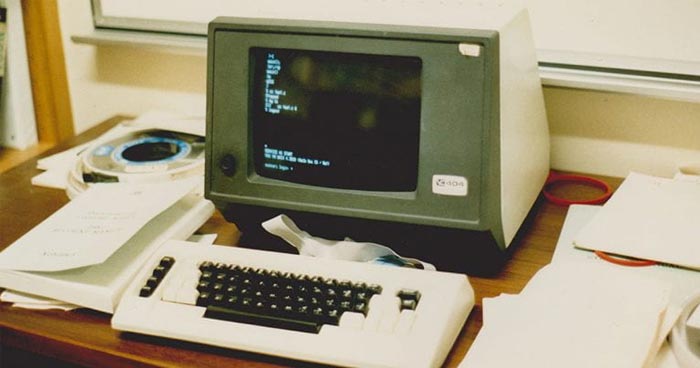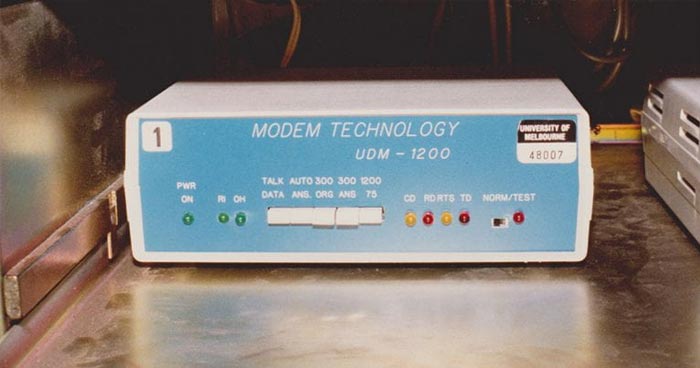A 35 year career in IT sees rapid change; Dr Rod Dilnutt made Fellow of the British Computer Society
By Dr Rod Dilnutt, Computing and Information Systems

Computer terminal c1987. Image courtesy University of Melbourne
To be recognised as a Fellow of the British Computer Society is very humbling. As I reflect on the world around me in 2019 it seems so far removed from where I started my career almost 35 years ago when music was played on vinyl and a computer in your pocket (like an iPhone) seemed impossibly futuristic.
My first job as a business analyst developed requirements for an information system that was to manage disability pension claims. Claims were processed manually and this system was the first introduction of computer-based support to make payments directly into bank accounts. Through the lens of 2019 this does not seem so exotic, but in a world where processing involved pens, paper and time, it was an exciting and innovative new approach; a sign of progresses to be made.
Nowadays known as the internet, professionals were keenly anticipating the connectivity of internally networked computers.
The disability pension system was on a mainframe and developed over two-years. Our programmes were written on coding sheets using grey lead pencils and entered into the computer manually. Most of the project team never got to see or interact directly with the computer; it occupied several floors of a building and consisted of large machines, tape readers and data entry terminals. A far cry from the portable devices we use today!

Staff tangled in magnetic tape, c1988. University of Melbourne.
I recall one of the main points of discussion was whether there would be one terminal allocated for 50 or 75 staff. It was decided that one between 75 service staff over two floors would be more than enough as any more was considered an extravagance! It was around this a time an IBM executive reportedly exclaimed ‘There is no reason anyone would want a computer in their home’. And so, the introduction of the now ubiquitous computer had begun.
A significant transition came leading up to the turn of the century when music CDs had replaced tape and vinyl. I was the Asia Pacific lead working with a management consultancy on a project aimed at sharing knowledge across more than 160 offices around the world.
Nowadays known as the internet, professionals were keenly anticipating the connectivity of internally networked computers.

1200bps modem, c1983. Image courtesy University of Melbourne
Another momentous occasion to us was the introduction of voicemail, again a seemingly commonplace tool today. Pre-voicemail, internationally spread project teams relied on ad-hoc telephone calls across countries and time zones in the often-vain hope of catching someone at their desk. How often do we play ‘phone tag’ today? This wasn’t even possible back in the 80s.
Technological advances allowed electronic file transfer, often only taking a few hours and synchronisation enabled replication of information around the world within days, and then hours. The introduction of networked computing -only within organisations at first but eventually the internet – became a reality and response time fell to hours, then minutes, then seconds to the instantaneous communications we enjoy today. And music was now in my pocket iPod.
Our world is now more connected than ever before. We are in the digital age where information has become the primary currency and where technology innovations disrupt business models that have existed for decades almost as matter of routine.
It’s a rapidly changing and exciting time to be an information and communication technology (ICT) professional with, yet unknown possibilities to improve our world. Through my appointment as Fellow at the University of Melbourne I am continually overwhelmed by the level of talent displayed in the student community. We now access music from the ‘Cloud’ through the computing power we have in our pockets and which pervades every aspect of social and economic activity and relationships. I have seen many changes and the only thing that is certain is that more change is to come. It is this generation that will continue to shape our world. I hope, in some small way that I have helped nurture the promise they bring for the future.